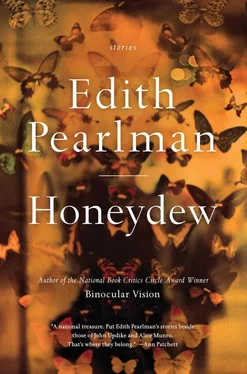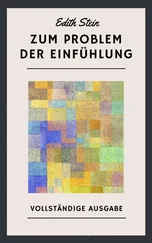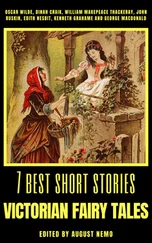The Malalis, in the province of Minas Gerais, Brazil, had reported an ecstatic sleep similar to but shorter than the unconscious state produced by opium, and full of visual adventures. Emily could attest to that, but she did not share her visions with Mr. da Sola, who enjoyed his own private coma beside her on the floor of her little room. In Emily’s repeated dream she was attending a banquet where she was compelled to crawl from table to table, sampling the brilliant food: pink glistening hams, small crispy birds on beds of edible petals, smoked fish of all colors ranging from the deep orange of salmon to the pale yellow of butterfish. And then: salads within whose leaves lurked living oysters recently plucked from their shells, eager to be nibbled by Emily; the mauve feet of pigs, lightly pickled; headcheese, the fragrance of calf still floating from its crock. And vegetables: eggplant stewed with squash blossoms; a pumpkin, its hat off, stuffed with crème fraîche and baked. And desserts: melons the color of peaches, and peaches the size of melons, fig preserves in hazelnut cups; and, at last, a celestial version of Brie en croûte, the croûte made of moth wings, for Mr. da Sola allowed a few moth grubs to hatch and mature and deposit their larvae before he gently pinched them dead and removed their new wings, and he caught butterflies too, in the outside garden, and sewed wing to wing to make several round fairy quilts and sugared and steamed them and laid them out on the carpenter’s table and plopped into each a light cheese faintly curdled; and then he molded several croûtes and baked them. He did all this off-dream. Emily plunged into the pastries. When she awoke there was often white exudate on her teeth, which she removed with her forefinger. Then she rubbed her fingertip dry on the unvarnished floor of the room while watching Mr. da Sola awake from his own glorious adventure, whatever it was. She suspected Alice was its heroine.
The rest of her time in the little room, Emily studied. She had become a master of the ant heart — like the hearts of all insects it was a primitive tube — and now turned her attention to the complicated stomach. She was soon to give a lecture on the ant stomach to the middle school and to anyone else who wanted to listen. Caldicott students were encouraged to share their interests. Wolfie Featherstone had recently talked about utopian societies, and her sidekick, Adele Alba, had analyzed figures of speech and the power of syntax.
And so, one Tuesday, Emily stood on a platform beside an easel where her diagrams were propped. “The abdomen is the segmented tail area of an ant,” she rasped, pointing with her father’s hiking stick. “It contains the heart and, would you believe it, the reproductive organs too, well, you probably would believe that, and it contains most of the digestive system. It is protected by an exoskeleton. And get this”—she licked her lips and let her pointer hang vertically between her pipe-cleaner legs until it touched the floor, making her look like a starving song-and-dance man—“the ant has not one stomach but two.”
“So does the cow,” drawled a fat girl.
“The cow’s two stomachs only serve the cow.”
“Serve the cow only,” corrected Adele.
“Whatever. The ant’s larger stomach, called the crop, is at the service of all. As an ant collects food and eats it, the nutrient is dissolved into a liquid and stored in the crop. When a fellow ant is hungry, its antennae stroke the food storer’s head. Then the two ants put their mouths together, together, together”—she controlled her unseemly excitement with the aid of the soothing smile Mr. da Sola sent from the back of the room—“and the liquid food passes from one to the other. And in addition to the generous crop, each ant has another, smaller stomach, its ‘personal belly.’”
Alice, wearing a faded denim dress, said, “Then the larger stomach belongs to the community.”
“Yes!” Emily said. “And if philosophers had brains in their heads they would realize that the ant’s collective pouch is the most advanced device that evolution, or God if you prefer, has come up with.”
“A soup kitchen,” interrupted the fat girl.
“And the ant feeding her associates through her mouth out of her own belly is the fundamental act from which the social life, the virtues, the morality, and the politics of the formicary — that’s the word for the ant as a society — are derived.” Alice saw that Emily used no notes. “Compared to this true collective, Wolfie, Brook Farm is a sandbox.”
A few girls were gagging or at least making gagging sounds.
“The ant is being exploited by her pals,” said the irritating fatty. Her size-six jeans were big on her and she wore her little sister’s tee. A strip of pink flesh showed between the two, like a satin ribbon. “When does she eat?”
“She cannot be said to eat as we understand eating,” said Emily severely. “She collects and stores and regurgitates. She is the life spring of her world.”
“So we evolved, and lost our second stomach,” Wolfie said. “We got ourselves brains instead. A good deal.”
“What’s good about the brain?” Emily said. “ It evolved to make money and war.”
“Zeugma!” Adele shouted.
Perhaps it was because of the only moderate success of her lecture, perhaps because of her binge at the banquet — at any rate, Emily turned up at the nutritionist that week at an unacceptable weight. She was hospitalized. She was not force-fed, but her room’s bathroom had no door, and while she consumed one pea at a time she was watched by a nurse’s aide with baroque curves.
“Sugar, eat,” the aide coaxed.
“Honey, do,” Emily mocked. But she acceded to the regimen; her work was calling her. Soon she’d gained enough to be discharged, though she’d have to see the nutritionist twice a week for a while. She was released a day earlier than planned. Her mother drove to the hospital in a downpour. She brought a present: a long, black vinyl raincoat with a hood.
“Thank you,” said Emily, unsurprised at the kindness of the gift. Her mother was everything a human was entitled to be: outspoken, attached to her particular children, unacquainted with tact. Ghiselle had no concern for the superorganism — but, after all, ever since the development of the spine, the individual had become paramount, the group disregarded. Ghiselle was only following the downhill path of her species.
“There’s a candy bar in the pocket of the raincoat,” Ghiselle said.
“Oh.”
“Wolfie and Adele can split it. Veux-tu rentrer? ”
“Pas encore. Laisse moi à la bibliothèque, s’il te plaît.” Emily was the only member of the family, Richard included, who had mastered enough French to converse with her mother in her mother’s tongue.
Ghiselle parked and Emily got out of the car. The rain had stopped. The new coat concealed Emily’s emaciation, and she had raised her hood against the suspended mist that had followed the rain, so her patchy hair was concealed too. She looked, Ghiselle thought, like any serious modern girl — bound for medical school, maybe, or a career in science.
Emily crossed the modest campus and entered the library. Ghiselle blew her nose and drove away.
“Emily is the heroine of the moment,” Alice murmured into Richard’s shoulder.
“Is she? They all love insects now?”
“No, they envy her monomania—”
“Polymania is more like it. Subway systems, for instance — she can diagram the underground of every major city in the world.”
“And they associate it with her lack of appetite, and they associate that with free will. ‘You can get a lot done if you choose to skip dinner,’ Wolfie Featherstone told me. Richard, not eating will become a fad and then a craze and then a cult.”
Читать дальше












